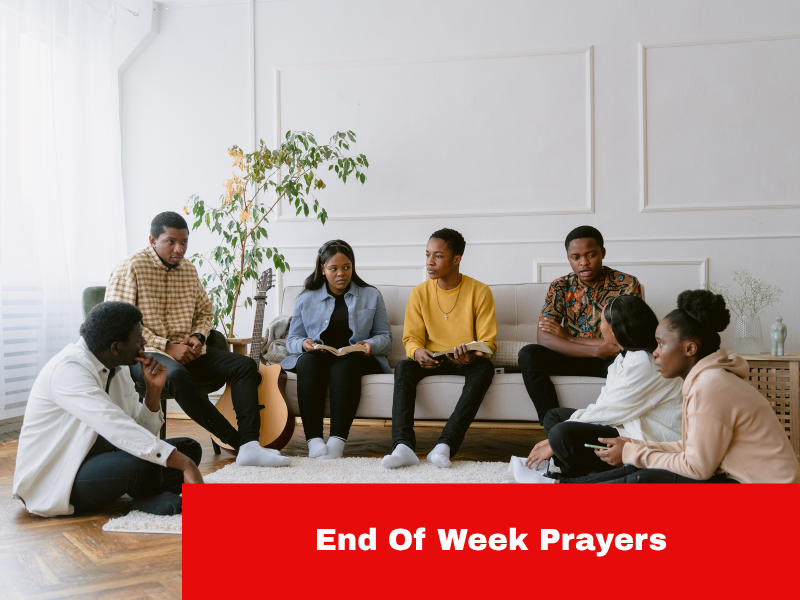As the week draws to a close, many of us find ourselves exhausted—mentally, emotionally, and spiritually. The demands of work, family, and daily responsibilities can leave us feeling drained, with little time to pause and reflect. Yet, this transition from one week to the next is a sacred opportunity—a chance to release our burdens, express gratitude, and seek divine renewal. End Of Week Prayers serve as a spiritual anchor, helping us close one chapter with peace and step into the next with hope.
Prayer has always been a powerful tool for believers, offering solace in times of stress and clarity in moments of confusion. When we intentionally set aside time at the end of the week to pray, we create space for God to speak to us, heal our weariness, and refill our hearts with His peace. These prayers are not just rituals; they are lifelines that reconnect us with our faith, reminding us that we are never alone in our struggles.
Whether you’ve had a week filled with victories or challenges, end-of-week prayers help you realign with God’s purpose. They allow you to surrender anxieties, celebrate blessings, and prepare your spirit for what lies ahead. In this article, we will explore the significance of these prayers, their key elements, and practical ways to make them a meaningful part of your weekly rhythm.
The Significance of End Of Week Prayers
In both Scripture and tradition, there is a sacred rhythm of rest and reflection. The concept of the Sabbath, observed at the week’s end, underscores the importance of pausing to honor God and rejuvenate the soul. End-of-week prayers follow this biblical model, providing a structured way to transition from labor to rest, from chaos to calm.
One of the greatest benefits of these prayers is their ability to bring closure. The week may have held disappointments, unmet goals, or conflicts—prayer allows us to lay these down before God instead of carrying them forward. Similarly, if the week brought joy and success, prayer turns those moments into offerings of gratitude. By intentionally reflecting, we acknowledge God’s hand in every circumstance, reinforcing our trust in His plan.
Additionally, end-of-week prayers cultivate a heart of humility and repentance. As we look back, we may recognize moments where we fell short—in patience, kindness, or faithfulness. Prayer becomes a space for honest confession and receiving God’s mercy. This practice not only cleanses the spirit but alsohttps://en.wikipedia.org/wiki/Confession_(religion) prepares us to enter the new week with a renewed sense of purpose and grace.
Elements of an End Of Week Prayers
A meaningful end-of-week prayer is more than just a quick “thank you” before sleep. It is a deliberate conversation with God, encompassing several key elements that bring depth and intentionality.
Thanksgiving should always be the foundation. Taking time to recount God’s blessings—both big and small—shifts our focus from what went wrong to what went right. Gratitude softens the heart and reminds us of God’s faithfulness, even in difficult seasons.
Reflection and repentance follow naturally. Looking back over the week with honesty allows us to identify areas where we may have strayed—whether in thought, word, or action. Bringing these before God in humility opens the door to His forgiveness and restoration.
Release and surrender are crucial for emotional and spiritual freedom. Many of us carry stress, regrets, or worries from the week. Prayer is the place to let them go, entrusting them to God’s care. This act of surrender brings profound peace, knowing that we are not meant to carry these burdens alone.
Petition for rest and renewal is especially important in our fast-paced world. Asking God to refresh our bodies, minds, and spirits ensures that we do not enter the next week in a state of exhaustion. True rest comes from Him, not just physical sleep.
Finally, preparation for the coming week sets a tone of expectancy. Praying for wisdom, strength, and divine guidance aligns our hearts with God’s will, ensuring that we move forward in faith rather than anxiety.
Sample End Of Week Prayers
Sometimes, finding the right words can be challenging. Below are a few sample prayers to guide you in your own end-of-week reflections.
A Simple Personal Prayer:
“Heavenly Father, as this week comes to an end, I thank You for Your constant presence. For every blessing, big and small, I give You praise. For the moments I fell short, I ask for Your forgiveness and grace. Help me to release all worries and stresses into Your hands. Renew my heart, mind, and body as I rest in You. Prepare me for the week ahead, and guide my steps according to Your will. In Jesus’ name, Amen.”
A Family Prayer:
“Lord, we come before You as a family, grateful for the week we’ve shared. Thank You for Your protection, provision, and the love that binds us together. Forgive us for any harsh words or missed opportunities to show kindness. As we enter this time of rest, fill our home with Your peace. Help us to support and encourage one another in the days ahead. May our hearts always seek You first. Amen.”
A Scriptural Prayer (Based on Psalm 23):
“Shepherd of my soul, You have led me through this week. Even in challenges, Your rod and staff comforted me. I thank You for green pastures and still waters—moments of joy and rest. As I lie down in Your presence, restore my soul. Anoint my head with fresh hope, and let Your goodness follow me into the coming week. Amen.”
Practical Tips for Consistent End Of Week Prayers
Making end-of-week prayers a regular part of your life doesn’t happen by accident—it takes intention and a little planning. If you’ve ever struggled to maintain a consistent prayer habit, you’re not alone. Life gets busy, distractions creep in, and before you know it, another week has passed without taking that much-needed time with God.
The good news is that with a few simple strategies, you can make end-of-week prayers a natural and meaningful part of your routine. Below, we’ll break down four key practices that can help you stay consistent and deepen your prayer experience.
1. Set a Dedicated Time
Why it matters:
If you don’t schedule prayer, it’s easy to forget or push it aside when other things come up. Just like you set aside time for meals, sleep, or important appointments, setting a specific time for prayer helps make it a priority.
How to do it:
-
Choose a consistent day and time that works best for you—maybe Friday evening to close out the workweek, Saturday morning as a fresh start to the weekend, or Sunday night to prepare your heart for the week ahead.
-
Put it in your calendar (with a reminder if needed) so you treat it as an important commitment.
-
Start small—even 10-15 minutes is a great beginning. Over time, you can extend it as you grow more comfortable.
Example:
If you know Fridays are usually less hectic, you might decide, “Every Friday at 7 PM, I’ll spend time in prayer before relaxing for the weekend.”
2. Create a Peaceful Environment
Why it matters:
It’s hard to focus on prayer if your mind is cluttered with distractions—whether it’s noise, your phone buzzing, or a messy space. A calm atmosphere helps you center your heart and mind on God.
How to do it:
-
Find a quiet spot—a corner of your room, a cozy chair, or even outdoors if you enjoy nature.
-
Set the mood with soft lighting (like a candle or dim lamp) or gentle worship music in the background.
-
Minimize distractions—silence your phone, close unnecessary tabs on your computer, and let others in your home know you need a few uninterrupted minutes.
-
Use a journal to write down your prayers, reflections, or things you’re grateful for from the week. Writing can help you focus and process your thoughts more deeply.
Example:
Before you begin praying, you might light a candle, play instrumental worship music, and take a few deep breaths to quiet your mind before speaking to God.
3. Incorporate Scripture
Why it matters:
Prayer isn’t just about talking to God—it’s also about listening. Scripture helps guide your prayers, reminds you of God’s promises, and keeps your heart aligned with His truth.
How to do it:
-
Pick a short passage to read before or during your prayer time. Some great options:
-
Psalm 23 (God’s care and guidance)
-
*Matthew 11:28-30* (Jesus’ invitation to rest)
-
*Philippians 4:6-7* (prayer and peace)
-
-
Reflect on the verses—ask yourself: What is God saying to me through this? How does this apply to my week?
-
Pray the Scriptures—turn the words into your own prayer. For example, if reading Psalm 46:10 (“Be still and know that I am God”), you might pray, “Lord, help me to slow down and remember that You are in control.”
Example:
You could open your prayer time by reading Psalm 107:1 (“Give thanks to the Lord, for He is good; His love endures forever.”), then spend a few moments thanking God for specific blessings from the week.
4. Pray with Others
Why it matters:
Prayer doesn’t always have to be solo—there’s power in praying with others. It encourages accountability, strengthens relationships, and reminds us that we’re part of a faith community.
How to do it:
-
Gather family or roommates for a brief time of shared prayer at the end of the week. Even five minutes together can make a difference.
-
Join or start a small group that meets weekly to pray and reflect.
-
If meeting in person isn’t possible, send a text or voice message to a friend with a prayer request or word of encouragement.
Example:
At dinner on Friday night, your family might share one thing they’re thankful for from the week, then pray together for the weekend ahead.
Final Thought: Start Small, Stay Consistent
You don’t have to do everything at once. If setting a dedicated time is all you can manage right now, start there. If you’re already praying alone, try adding Scripture or inviting someone to join you. The key is to build a habit that feels natural and life-giving, not like another item on a to-do list.
Over time, these end-of-week prayers will become something you look forward to—a sacred pause to release the week behind you and step into the days ahead with God’s peace and guidance.
1. Why is it important to pray at the end of the week?
Answer:
End-of-week prayers help you reflect on God’s faithfulness, release stress, and prepare your heart for the coming week. Just as the biblical Sabbath provided rest and worship, these prayers create a spiritual “pause” to realign with God’s presence. They foster gratitude, repentance, and renewal, ensuring you don’t carry the weight of the week into the next.
2. What if I don’t have time for a long prayer?
Answer:
Prayer doesn’t have to be lengthy to be meaningful. Even a 5-minute prayer can make a difference. Focus on:
-
Thanksgiving (1-2 things you’re grateful for),
-
Release (1 worry or regret to surrender to God),
-
Request (1 thing you need for the week ahead).
Example: “Lord, thank You for [blessing]. Help me let go of [worry]. Guide me in [upcoming need].”
3. How can I stay consistent with end-of-week prayers?
Answer: Try these practical tips:
-
Attach it to a habit: Pray right after a weekly routine (e.g., after Friday dinner or Sunday night chores).
-
Use reminders: Set a phone alert or leave a sticky note where you’ll see it.
-
Keep it simple: Start with a short prayer structure (like the one above) to avoid feeling overwhelmed.
4. What if I don’t know what to pray about?
Answer: Use the “GRACE” framework as a guide:
-
Gratitude: What went well this week?
-
Regret: What do I need to confess or release?
-
Ask: What do I need from God next week?
-
Compassion: Who needs my prayers?
-
Expectation: What Scripture encourages me? (Try Psalm 23 or Matthew 11:28-30.)
5. Can I pray alone, or should I include others?
Answer: Both are valuable!
-
Alone: Allows personal reflection and vulnerability with God.
-
With others: Builds community and shared faith (e.g., family prayers or a friend check-in).
Tip: If praying aloud feels awkward, try writing prayers together or using a guided prayer app.
Bonus Question: “What if I miss a week?”
Answer: Grace over guilt! God isn’t keeping score. Simply resume the next week. Consistency grows over time, not perfection
Conclusion
End-of-week prayers are more than a spiritual discipline—they are a gift. In a world that never stops moving, these moments of intentional prayer allow us to pause, breathe, and reconnect with God. They remind us that every week, no matter how chaotic, is held in His hands. When we close the week in prayer, we acknowledge that our lives are not ruled by chaos but by the peace of Christ.
As you develop this habit, you may find that your perspective shifts. Challenges that once felt overwhelming become opportunities for trust. Joys become sacred moments of gratitude. Even in exhaustion, you’ll discover a deeper rest—one that comes from knowing God is with you, now and in the week ahead. May your end-of-week prayers become a sanctuary—a holy pause where heaven meets earth, where weariness turns to worship, and where every ending becomes a new beginning in Him.







